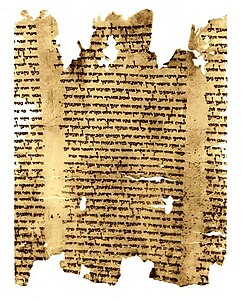|
Isaiah 58
Isaiah 58 is the fifty-eighth chapter of the Book of Isaiah in the Hebrew Bible or the Old Testament of the Christian Bible. This book contains the prophecies attributed to the prophet Isaiah, and is one of the Books of the Prophets. Chapters 56-66 are often referred to as Trito-Isaiah.[1] This chapter contains a proclamation regarding "fasting that pleases God".[2] TextThe original text was written in Hebrew language. This chapter is divided into 14 verses. Textual witnessesSome early manuscripts containing the text of this chapter in Hebrew are of the Masoretic Text tradition, which includes the Codex Cairensis (895), the Petersburg Codex of the Prophets (916), Aleppo Codex (10th century), Codex Leningradensis (1008).[3] Fragments containing parts of this chapter were found among the Dead Sea Scrolls (3rd century BCE or later):
There is also a translation into Koine Greek known as the Septuagint, made in the last few centuries BCE. Extant ancient manuscripts of the Septuagint version include Codex Vaticanus (B; B; 4th century), Codex Sinaiticus (S; BHK: S; 4th century), Codex Alexandrinus (A; A; 5th century) and Codex Marchalianus (Q; Q; 6th century).[4] ParashotThe parashah sections listed here are based on the Aleppo Codex.[5] Isaiah 58 is a part of the Consolations (Isaiah 40–66). {P}: open parashah.
Verse 3
Verse 12
In some versions, "the old waste places" is translated as "ancient ruins": John Skinner, in the Cambridge Bible for Schools and Colleges, suggests that "the description of the ruins as 'ancient' suggests a period considerably later than the Exile (which only lasted half a century), although the argument is not one that can be rigorously pressed".[8] See alsoReferences
Bibliography
External linksJewishChristian |
||||||||||||||||||

